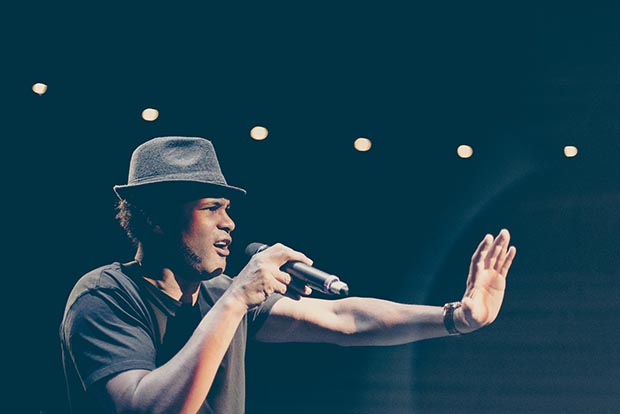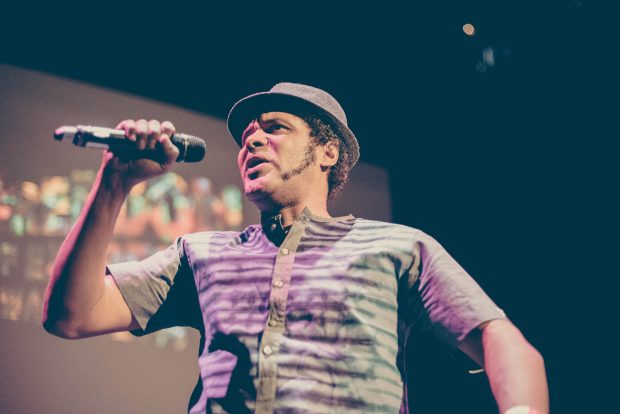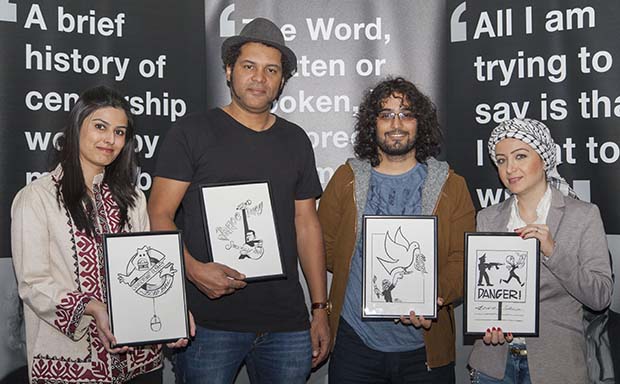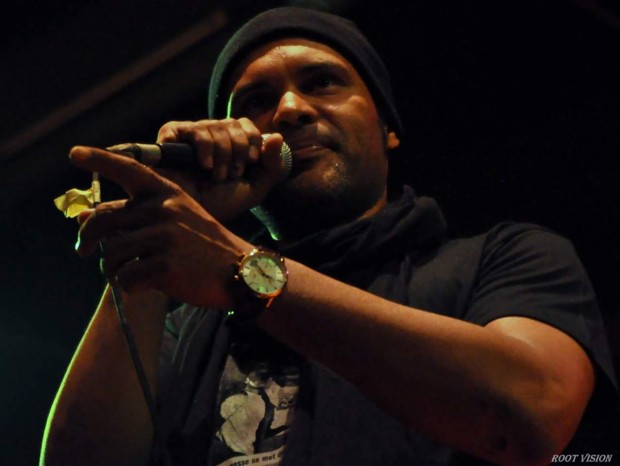Index relies entirely on the support of donors and readers to do its work.
Help us keep amplifying censored voices today.
[vc_row][vc_column][vc_column_text]

Music in Exile Fellowship Winner Serge Bambara, aka Smockey (Photo: Elina Kansikas for Index on Censorship)
On 3 March in Belfort, France, Burkinabe rapper and activist Smockey began a two-month long European tour, despite having his studio destroyed twice in recent years. The rapper, whose given name is Serge Bambara, was the inaugural Index on Censorship Music in Exile Fellow in April of the same year. Just three months after the awards, his recording studio, Studio Abazon, was wrecked in a devastating fire.
“All my music files since 2001, including my master tapes and those of my productions and clients, were lost,” Smockey told Index in September 2016. Two years on, it remains unclear how the fire began.
Smockey’s studio was also bombed in September 2015 by armed forces loyal to Burkina Faso’s former president Blaise Compaoré. This was a vengeful attack for his political activism and music critical of Compaoré’s regime.
Despite these aggressive and censorious acts, Smockey continues to record and perform, combating different forms of injustice with each track. As the founder of the grassroots political movement Le Bilai Citoyen, which helped to oust Compaoré, he often promotes the progressive ideas of Burkina Faso’s former socialist leader Thomas Sankara. The Sankarist ideology involves advocating for women’s rights, fighting corruption and imperialism, and upholding the integrity of Burkinabe people, all of which are reflected in Smockey’s lyrics. La Bilai Citoyen translates as the “the citizen’s broom,” which is “a tribute to Thomas Sankara, who organised weekly street-cleaning sessions,” Smockey told the BBC.
In March 2018 Smockey told news website Africa is a Country that Sankara’s image was that of “simplicity, modesty, and integrity … a model for anyone aspiring to manage public property”. He also noted that Sankara had the “courage and determination to build a Burkina Faso of social justice and inclusive development.”
Although the uprising of 2015 was successful in ridding Burkina Faso of an oppressive twenty-seven-year regime, Smockey is not an enthusiastic supporter of the country’s current government led by the progressive former opposition leader Roch Marc Christian Kaboré. Smockey is still a watchdog for human rights violations within his country. “The ones who were our friends before the revolution can be our enemies today,” he told Quartz Africa in July 2016. “We helped them have this power, but we are not friends because we are still sentinels.” For example, his song Tomber la Lame takes aim at widespread Female Genital Mutilation throughout Africa.
Despite multiple attempts to stop his political and artistic expression, Smockey continues to create and share his music globally. Over six weeks he will perform throughout Europe, finishing his tour in Brussels, Belgium, on 14 April.
[/vc_column_text][/vc_column][/vc_row][vc_row][vc_column][vc_basic_grid post_type=”post” max_items=”4″ element_width=”6″ grid_id=”vc_gid:1522161604778-9ae9ecbc-682f-8″ taxonomies=”8072″][/vc_column][/vc_row]
[vc_row][vc_column][vc_custom_heading text=”Contributors include Richard Sambrook, Dominic Grieve, Roger Law, Karim Miské, Mark Frary and Canan Coşkun”][vc_row_inner][vc_column_inner width=”1/2″][vc_column_text]
[/vc_column_text][/vc_column_inner][vc_column_inner width=”1/2″][vc_single_image image=”88802″ img_size=”full”][/vc_column_inner][/vc_row_inner][vc_column_text]
[/vc_column_text][/vc_column][/vc_row][vc_row][vc_column][vc_custom_heading text=”SPECIAL REPORT: THE BIG SQUEEZE” css=”.vc_custom_1481731933773{margin-right: 0px !important;margin-left: 0px !important;border-bottom-width: 1px !important;padding-top: 15px !important;padding-bottom: 15px !important;border-bottom-color: #455560 !important;border-bottom-style: solid !important;}”][vc_column_text]
[/vc_column_text][/vc_column][/vc_row][vc_row][vc_column][vc_custom_heading text=”IN FOCUS” css=”.vc_custom_1481731813613{margin-right: 0px !important;margin-left: 0px !important;border-bottom-width: 1px !important;padding-top: 15px !important;padding-bottom: 15px !important;border-bottom-color: #455560 !important;border-bottom-style: solid !important;}”][vc_column_text]
[/vc_column_text][/vc_column][/vc_row][vc_row][vc_column][vc_custom_heading text=”CULTURE” css=”.vc_custom_1481731777861{margin-right: 0px !important;margin-left: 0px !important;border-bottom-width: 1px !important;padding-top: 15px !important;padding-bottom: 15px !important;border-bottom-color: #455560 !important;border-bottom-style: solid !important;}”][vc_column_text]
[/vc_column_text][/vc_column][/vc_row][vc_row][vc_column][vc_custom_heading text=”COLUMNS” css=”.vc_custom_1481732124093{margin-right: 0px !important;margin-left: 0px !important;border-bottom-width: 1px !important;padding-top: 15px !important;padding-bottom: 15px !important;border-bottom-color: #455560 !important;border-bottom-style: solid !important;}”][vc_column_text]
[/vc_column_text][/vc_column][/vc_row][vc_row][vc_column][vc_custom_heading text=”END NOTE” css=”.vc_custom_1481880278935{margin-right: 0px !important;margin-left: 0px !important;border-bottom-width: 1px !important;padding-top: 15px !important;padding-bottom: 15px !important;border-bottom-color: #455560 !important;border-bottom-style: solid !important;}”][vc_column_text]
[/vc_column_text][/vc_column][/vc_row][vc_row][vc_column][vc_custom_heading text=”SUBSCRIBE” css=”.vc_custom_1481736449684{margin-right: 0px !important;margin-left: 0px !important;border-bottom-width: 1px !important;padding-bottom: 15px !important;border-bottom-color: #455560 !important;border-bottom-style: solid !important;}”][vc_column_text]Index on Censorship magazine was started in 1972 and remains the only global magazine dedicated to free expression. Past contributors include Samuel Beckett, Gabriel García Marquéz, Nadine Gordimer, Arthur Miller, Salman Rushdie, Margaret Atwood, and many more.[/vc_column_text][vc_row_inner][vc_column_inner width=”1/2″][vc_single_image image=”76572″ img_size=”full”][/vc_column_inner][vc_column_inner width=”1/2″][vc_column_text]In print or online. Order a print edition here or take out a digital subscription via Exact Editions.
Copies are also available at the BFI, the Serpentine Gallery, MagCulture, (London), News from Nowhere (Liverpool), Home (Manchester), Calton Books (Glasgow) and on Amazon. Each magazine sale helps Index on Censorship continue its fight for free expression worldwide.
![]() SUBSCRIBE NOW[/vc_column_text][/vc_column_inner][/vc_row_inner][/vc_column][/vc_row]
SUBSCRIBE NOW[/vc_column_text][/vc_column_inner][/vc_row_inner][/vc_column][/vc_row]

Burkinabe rapper and activist with Le Balai Citoyen, Smockey, became the inaugural Music in Exile Fellow at the Index on Censorship Freedom of Expression Awards in April 2016. In July his recording studio, the lionised Studio Abazon, was destroyed in a fire.
“All my music files since 2001, including my master tapes and those of my productions and clients, were lost,” Smockey told Index on Censorship. “I was working on the album of a young rapper named Balla, volume three of my compilation called La Part des Ténèbres and original music for a mobile phone service product – all gone.”
Two months on, it still isn’t clear what caused the blaze. “I don’t have any news about ongoing investigations, so all I know is that anyone could have caused it apart from me,” he said.
Studio Abazon was impossible to insure due to a September 2015 firebomb attack by forces loyal to Burkina Faso’s ousted president, which destroyed the studio. Having recently finished rebuilding in the months before the fire, Smockey said he is obliged to do so again. “But this time I will build it underground to make it more secure.”
Some of Smockey’s friends have launched a crowdfunding campaign to raise funds for the studio and the rapper said he would welcome all the help he can get.
When he last spoke with Index, Smockey was writing tracks for his new album. Plans to record have now been put on hold.
Still, the setback hasn’t put the rapper off performing. He recently played to packed gigs in Switzerland, Germany and Belgium, where he took part in the Esperanzah! music festival. In October he will take the stage in his home country at the Waga Hip Hop Festival. In November he will return to Germany — for appearances in Berlin and Munich — and Switzerland. In December, he will perform in Spain.
Le Balai Citoyen, which Smockey co-founded, is a grassroots political movement which helped bring to an end the three-decade rule of former president Blaise Compaoré. It is currently involved in a new project to build a memorial for the late revolutionary Burkinabe leader, and hero of Smockey’s, Thomas Sankara. To raise funds and awareness for the memorial, Smockey will soon perform at Revolution Square, where up to a million people had gathered to demand Compaore’s resignation in 2014.
“We are just nine months past the insurrection, so now is a good time for the memorial,” Smockey told Index. “Seeing it every day in the city would help put pressure on those in power — those who think they can manipulate us but are mistaken — to do their job.”
Rehabilitating the memory of Sankara – who was overthrown and assassinated in a coup d’état led by Compaoré in 1987 – is, therefore, an important part of bringing about of justice for all affected by the crimes of the former regime, Smockey said.
The former prime minister of Burkina Faso, Luc-Adolphe Tiao, who was appointed by Compaoré, was this month charged and jailed for murder. Smockey welcomes this as a step forward for the country.
“We encourage everyone who is implicated in these crimes to stand before justice in this country, at least because we have a certain sense of honour,” he said. “Burkina Faso literally means the land of men with integrity, so we would like to trust the justice of our country.”
Le Balai Citoyen is now working with a coalition of seven other organisations, collectively called Ditanyè, to tackle the challenges facing the country and to preserve “the positive gains from the revolution,” Smockey added.
Looking forward, he understands the country must have priorities and the courage to define them. “After justice, which is necessary for reconciliation, we have to work on the economic recovery and jobs for young people,” he said. “We want to work now.”
Nominations are now open for 2017 Index on Censorship Freedom of Expression Awards. You can make yours here.

Winners of the 2016 Freedom of Expression Awards: from left, Farieha Aziz of Bolo Bhi (campaigning), Serge Bambara — aka “Smockey” (Music in Exile), Murad Subay (arts), Zaina Erhaim (journalism). GreatFire (digital activism), not pictured, is an anonymous collective. Photo: Sean Gallagher for Index on Censorship
Also read:
Zaina Erhaim: Balancing work and family in times of war
Artist Murad Subay worries about the future for Yemen’s children

Serge Bambara, aka Smockey, is a hip-hop artist, producer and activist within Le Balai Citoyen, or the Citizen’s Broom, a grassroots political movement seeking change in Burkina Faso. His music fuses hip-hop with traditional Burkinabe music, to critique and satirise government corruption, the lack of democracy, poverty and prejudice against women within the country.
His acclaimed Studio Abazon was fire-bombed in September 2015 in retaliation for his role in the ending of the 27-year tenure of former President Blaise Compaoré. Smockey has no doubt the attack was an attempt on his life in revenge for his activism. Thankfully the rapper was in hiding at the time and was unharmed.
Index on Censorship has named Smockey as the inaugural recipient of the Music in Exile Fund Fellowship. As the beneficiary, he will perform live in London, as well as receive training and opportunities to connect with other free speech heroes around the world. Smockey is committed to getting his studio up and running again and creating more music. Here’s just a snippet of his work as a musician and producer.
Smockey – Votez Pour Moi
Votez Pour Moi (Vote for Me) was released at the time of the 2005 presidential elections in Burkina Faso. It is about the dire state of democracy in the country. “This song is very ironic and satirical,” says Smockey. “In it, I play the role of a dictator making many promises he doesn’t intend to keep.” Dictators aren’t known for their sense of humour, but so out of touch was Compaoré’s government that they actually used Votez Pour Moi in their political campaign, playing on the TV every day.
“They didn’t listen to the lyrics and so didn’t realise it was a joke at their expense. Being in power for 30 years, they could only think of themselves,” Smockey told Index on Censorship.
Smockey – A Qui Profite le Crime
The title of this track translates as: who benefits from the crime? It is about the assassination of Thomas Sankara, the revolutionary president of Burkina Faso from 1983 until his assassination in 1987. Smockey is a self-proclaimed Sankarist, a left-wing ideology in the tradition of Sankara, who was murdered during a coup d’état organised by Compaoré.
The opening lines of the song, translated from their original French, are as follows: “So everything was planned from the beginning / For the country, but the finish is death we were served; routine investigation / Who benefits? Who benefits from the cime? / Who knows? / We were misled.”
Smockey – Tomber la Lame
Tombre la Lame (Falling Blade) is a song about female genital mutilation, a practice still common in Burkina Faso. “It happens as a result of local traditions and customs, and also religion, namely Islam,” explained Smockey. “It’s a very bad practice; women get hurt and go on to have complications later in life, such as when giving birth.” FGM is a major problem in West Africa in general, and Smockey wants to “convince people that they have to stop it”. Sankara was committed to women’s rights during his brief time in power and outlawed FGM, among other things. “When Sankara was killed, progress on this front was stopped in its tracks, so we have to continue the fight,” said Smockey.
Smockey – A Balles Reelles
In 2008, students in Ouagadougou, the capital of Burkina Faso, faced severe hardship following the sudden eviction from their halls of residence, the closure of essential facilities and the cancellation of welfare payments without notice. Authorities took the action following confrontations between students and police on 22 June 2008.
Balles Reelles, which translates as “real bullets”, is a song criticising the authorities for their harsh treatment of young people. At a press conference, Smockey and his collaborator on the track, the reggae artist Sams’K Le Jah, also criticised the passivity of the students’ parents in the face of the harsh treatment of their children. “Parents are silent when the university is closed and some students have become vulnerable,” Le Jah said.
Les Ambassadeurs de la Liberté d’Expression – Le Droit de Vivre
Les Ambassadeurs de la Liberté d’Expression, or the Ambassadors for Freedom of Expression, is a collaborative project effort including Smockey and other musicians from west Africa who are committed to strengthening freedom of expression in the region. Le Droit de Vivre (The Right to Live) was recorded at Studio Abazon before it was bombed. It is a song against extremism and injustice.
Other artists in the project include Didier Awadi of Senegal, Sissao, Alif Naaba from Burkina Faso, and Marechal Zongo, Josey and Soum Bill from Côte d’Ivoire, among others.
“Not everyone is lucky enough to have a microphone in front of them, so if you have the chance to talk, you have to say something important,” Smockey said of the project. “Art doesn’t just have to be beautiful – it can be beautiful and useful at the same time.”
Index on Censorship has teamed up with the producers of an award-winning documentary about Mali’s musicians, They Will Have To Kill Us First, to create the Music in Exile Fund to support musicians facing censorship globally. You can donate here, or give £10 by texting “BAND61 £10” to 70070.